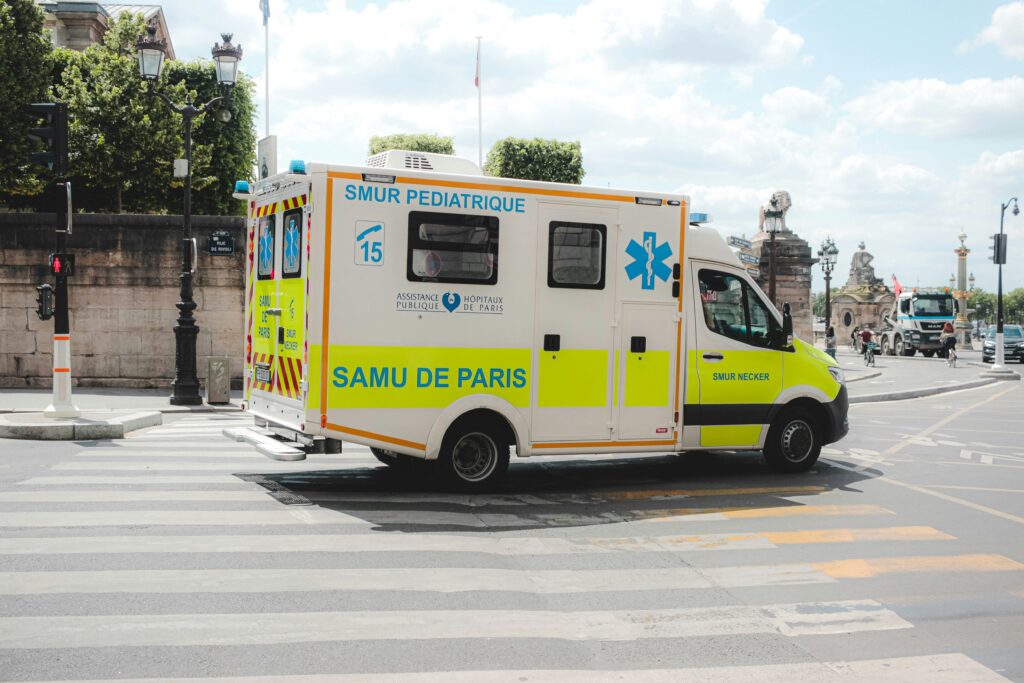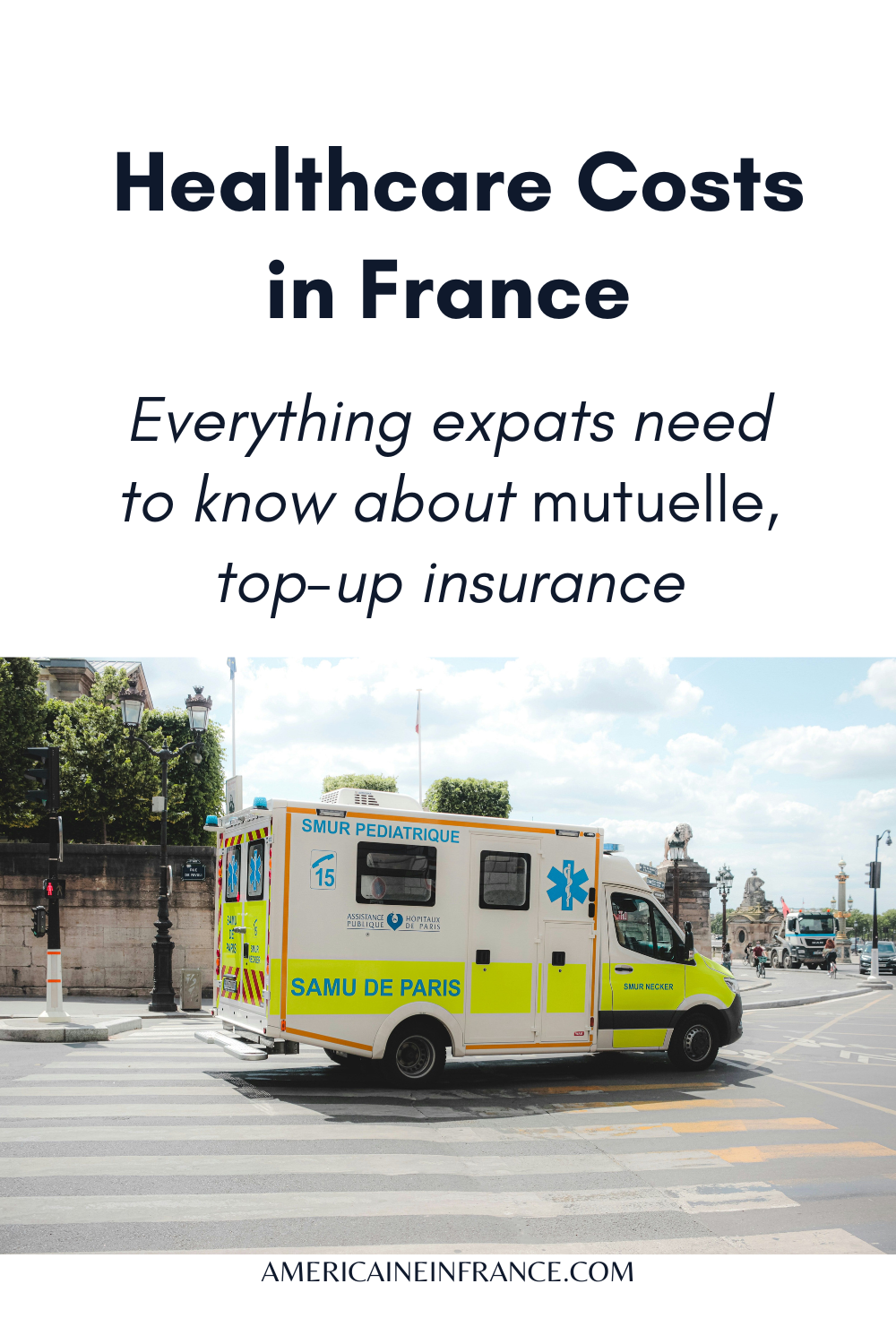This post may contain affiliate links, meaning that if you click and make a purchase, I may earn a commission at no additional cost to you. Read the full disclosure here.
Last Updated: July 23, 2025
While the French healthcare system is generous, it doesn’t cover everything. Dental work, glasses, therapy sessions, or a private hospital room? You’re mostly on your own unless you have a mutuelle, a top-up insurance that fills in the gaps in coverage.
This guide explains exactly what the public system doesn’t cover and why a good mutuelle is essential to consider as an expat in France.
Disclosure: This is a sponsored post in partnership with Fab French Insurance. As always, all opinions are my own.

What is a French Mutuelle?
A mutuelle is a private, supplementary insurance policy that helps pay for what the French public healthcare plan (Assurance Maladie) doesn’t cover. If, like me, you thought that your green carte vitale would grant you free access to healthcare in France without ever making a co-pay, you’re not alone—it’s a common misconception!
Also known as top-up insurance, a mutuelle helps bridge the gap between the standard reimbursement from la sécu and the full cost. Depending on the coverage, it even reimburses certain medical expenses that aren’t reimbursed at all by the public national health insurance.
Residents in France are required to have basic medical insurance, either through Assurance Maladie or private insurance. On the other hand, a mutuelle is not compulsory for everyone.
📌 Pro Tip: Even if it’s not mandatory for you, a mutuelle can prove to be beneficial during the visa renewal process. Some préfectures have been known to ask for proof of top-up insurance in order to show your full integration in France. My husband and I have a joint mutuelle and I’ve submitted it for each residence permit renewal as the spouse of a French citizen to confirm our life together (vie commune).
Only employees working in the private sector are required to have top-up insurance. In this case, the employer must have a plan available. It is mandatory for private sector employees to enroll in this insurance unless they are already covered by another top-up insurance.
⚠️ FYI, you can’t enroll in a mutuelle unless you are already enrolled in the national healthcare plan. For expert guidance on how the healthcare system in France works, including the key steps to get coverage, check out the replay of this webinar on the FAB Expat YouTube channel: French Healthcare System: How to Get In and Practical Navigation.
What Does the French Healthcare System Cover?
Assurance Maladie covers a portion of most medical care in France. This includes basic, routine care, picking up prescriptions from the pharmacy, consulting with specialists, and receiving emergency services.

The standard reimbursement is generally 70% for doctor’s appointments and 65% for medications. There’s more nuance to it than this, but we’re going for the simplified version here!
Reimbursements are calculated using the base rate that is set forth by the government. Health professionals who are classified as secteur 1 charge these fixed base rates for consultations. Doctors who are classified as secteur 2 or secteur 3 (non conventionné) set their own rates. The reimbursement is the same regardless of the rates applied by the practitioner.
For example, a consultation with a secteur 1 general practitioner (GP) is €30. From this amount you’ll be reimbursed €19. If you think my math is a bit off, good catch! 70% of €30 is actually €21. However, the €19 reimbursement takes into account the obligatory participation forfaitaire of €2, a fixed contribution applied per medical act. A mutuelle will pick up the remaining 30% of the consultation fee.
If you choose to consult a secteur 2 general doctor, even though they charge a higher rate, the reimbursement is the same. Therefore, you’ll be left with a higher out-of-pocket expense (unless you’ve taken a good mutuelle!). Rates set by sector 2 general practitioners can vary, but you’ll largely find they charge between €50 and €70.
Assurance Maladie covers pregnancy-related costs relatively well. All medical costs during a pregnancy are covered at 100% by the public healthcare system starting in the 6th month of the pregnancy. Prior to that, only appointments associated with the pregnancy are fully covered (up to the base rate!). It sounds great on paper (and yes, it is!), but I did discover that not everything is fully covered, notably ultrasounds.
What’s NOT Covered by Assurance Maladie?
As mentioned above, the higher fees charged by doctors outside of secteur 1 are not covered by Assurance Maladie. Many people opt to only consult sector 1 health professionals for this reason.
However, depending on the availability of health professionals in the area where you live, it’s not always practical to only consult sector 1 doctors. There’s a shortage of doctors in France, and it’s been my experience that specialists, including gynecologists, dermatologists, and ear, nose, and throat doctors, have a tendency to practice in sector 2 with rates ranging from €60 to over €100.
Dental care is notoriously not well reimbursed in France. Standard checkups and simple procedures are partially covered. On the other hand, involved work like crowns, implants, and orthodontics can incur high costs.
While eye exams themselves are well covered by the national plan, glasses and contact lenses are generally poorly reimbursed. The cost for complex lenses and nice frames can be expensive.

Healthcare classified as alternative medicine, called médecine douce, is not covered by Assurance Maladie. During my pregnancy, I was able to consult an osteopath for back pain. The sessions, which cost €70 each, were completely reimbursed through my mutuelle. Other examples of alternative medicine that may be reimbursed by a mutuelle include acupuncture, psychotherapy, or seeing a dietician. The level of reimbursement depends on the coverage secured!
Hospital stays and emergency treatment are covered by Assurance Maladie, but any upgrades, such as a private room, are not covered. After giving birth, I was so thankful to have a private room. My stay in a public hospital in Paris, at a cost of €70/day, was paid for by my mutuelle.
How Do You Take Out a Mutuelle?
If you’re a salaried employee in the private sector, you don’t have much choice in the matter since you’re required to enroll in your employer’s coverage unless you already have coverage in place.
In other situations, such as self-employed (freelance) or retired, you’re on your own for finding top-up insurance. There are a lot of options out there.
To sift through policies on your own, you can use an online comparison tool to check out the different plans and benefits. There are numerous websites with a comparateur available, and after plugging in just some basic information, you can get un devis (a quote) quite easily. Unfortunately, these websites are in French, and any autotranslating you do might leave out some important details.
Another option is to work with an insurance broker. Not only will they do the comparison legwork for you, but they can also answer questions about the proposed policies in relation to your specific needs. Many will also provide further support when making a claim.
Fab French Insurance is an English-speaking company with a small team all based in France. Having worked with him myself, I can tell you that Fabien, the founder, is an absolute gem when it comes to making real connections with his clients. He’s passionate about simplifying the French insurance scene for expats by providing transparent and affordable solutions.
Is It Worth Having a Mutuelle in France?
Everyone has different health needs. If you’re in relatively good health, a mutuelle could seem like a waste of money. The best way to see if a mutuelle is worth it for you personally is to get an estimate on pricing through an insurance broker. It doesn’t cost anything to get quotes, and working with an insurance broker provides you with a point person so that you can ask questions and ensure that the mutuelle is adapted to your needs.
✅ Fab French Insurance offers a free 30-minute consultation to talk about your situation and see what you might require.
Another thing to take into account is that the mutuelle is there in case of an unexpected health issue such as hospitalization. Unlike in the United States, going to the emergency room in France is definitely not going to leave you bankrupt. However, the sécu does not typically fully reimburse hospital treatments, and you might be left with some out-of-pocket expenses.

As far as my typical usage goes, I find that my mutuelle at least pays for itself over the course of a year. My husband doesn’t go to the doctor as often as me, but he wears glasses, so he makes use of his mutuelle in this way. And my one-and-a-half-year-old? Well, he is absolutely reaping the benefits because his portion is paid for within just a few months of the calendar year due to the frequency of checkups and vaccines as a baby.
Something I hadn’t really considered regarding healthcare in France is how hard it can be to find and get appointments with certain healthcare providers. When I lived in the 11th arrondissement of Paris, nearly all of the healthcare professionals I consulted in my neighborhood were secteur 1. My family and I moved to the 15th arrondissement earlier this year, and most of the doctors I’ve found within walking distance are secteur 2, meaning they charge higher rates. All this to say that finding a doctor that charges the base rate might be difficult or impractical depending on your location.
Having a mutuelle is not required for everyone, but it is highly recommended or at the very least worth considering. Get your estimate in seconds!


